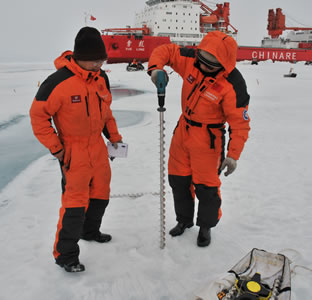UTSA geoscientist Hongjie Xie participates in Chinese Arctic expedition

UTSA Associate Professor Hongjie Xie (left) in the Arctic

UTSA Associate Professor Hongjie Xie (left) in the Arctic
(Nov. 30, 2010)--After spending two months in the Arctic Ocean aboard the Chinese vessel Xuelong or "Snow Dragon," Hongjie Xie, UTSA associate professor of geological sciences, says global warming is both real and imminent. In fact, Arctic ice is melting faster than researchers thought it would.
While much of the global-warming debate has focused on the reasons for global warming and the disadvantages brought on by it, such as the impact on Arctic ecology, marine mammals and indigenous communities, Xie says the Chinese believe it also creates a significant opportunity.
"Global warming in the Arctic is an extremely hot topic in navigation," said Xie, who manages the UTSA Laboratory for Remote Sensing and Geoinformatics. "The Chinese are extremely interested because they and others would be able to sail their cargo ships through the Arctic Ocean to North America and Europe with much reduced cost. At the melting rate we are observing now, they may be able to do so in 30 to 50 years."
"In the past, travelers could only get to the lowest Arctic latitudes in the summer season, but now the ice has melted so much, large ships can navigate into the higher latitudes. Xuelong traveled to 88.4 degrees latitude with no problems. A few years ago, we could not have done that. We would have run into ice blocks three meters or more in thickness."
He notes, however, "While there is a great opportunity, Arctic navigation is a complex issue. Those involved will need to consider a variety of factors such as environmental pollution, oil spills, search and rescue, national security and navigation rights in territorial waters."
Xie and a scholar from the University of Georgia were the only Americans invited to take part in the fourth Chinese Arctic Expedition, a two-month data-gathering trip organized by the Chinese government. The trip served as a fact-finding mission for Xie, who represented the U.S. National Oceanic and Atmospheric Administration's Sea Ice Outlook program. The Chinese focused their research on the mechanisms of sea ice melting, the impact of that melting on the Arctic ecosystem and how it might affect the Chinese climate.
In all, 61 researchers, 54 crewmembers and six Chinese journalists participated in the expedition. They represented France, Finland, Taiwan, Estonia, the United States and numerous Chinese universities and research programs.
So, why does Xie think Arctic sea ice is melting so rapidly?
"It's a positive feedback system," he said. "Sea ice melts both from the bottom up due to increased ocean temperature and from the top down. When that happens, the melted ice leaves more open water, which absorbs more solar radiation and raises the temperature of the water even more. The temperature increase causes even more ice to melt and so on and so forth."
While in the Arctic, Xie took photos, videos and quantitative measurements of Arctic sea ice during his journey. That "in situ" data will be combined with satellite data to help researchers across the world better understand Arctic climate and change.
Xie launched his career in 2002 after earning his doctorate in remote sensing and geographic information systems (GIS) at the University of Texas at El Paso. In 2004, he joined UTSA's faculty. He and world-renowned sea ice scientist Stephen Ackley, a UTSA research associate professor, gained funding from the National Science Foundation Office of Polar Programs and the National Aeronautics and Space Administration Cryosphere Science program.
Since then, Xie and his group have taken two expeditions to Antarctica (2006 and 2007) in addition to his 2010 Arctic expedition. Xie and Ackley will send researchers and students on two additional Antarctic sea ice trips in November and December 2010. Xie hopes to participate in the 2012 Chinese Arctic expedition by sending a couple of UTSA graduate students as well.
Events
This event will acknowledge graduating seniors from the McNair Scholars program at UTSA before inducting the new cohort of scholars into the program.
North Paseo Building (NPB 5.140), Main CampusAt this memorable celebration, UTSA graduates will be introduced one-by-one to cross the stage and accept their doctoral degrees.
Arts Building Recital Hall, Main CampusRoadrunner Walk is an event for graduating students to have a memorable walk on campus to celebrate an important milestone and their achievements. Graduates will walk along the Paseo while being celebrated by the UTSA community, friends, and family members.
Student Union Paseo, Main CampusCelebrate the accomplishments of College of Education and Human Development, College for Health, Community and Policy, College of Sciences and University College.
Alamodome, 100 Montana St.Celebrate the accomplishments of Alvarez College of Business, College of Liberal and Fine Arts and Klesse College of Engineering and Integrated Design.
Alamodome, 100 Montana St.

